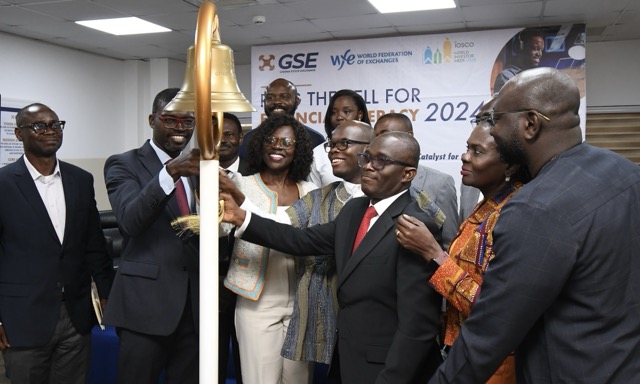
Technology key to growing capital market — Abena Amoah
THE Managing Director (MD) of the Ghana Stock Exchange (GSE), Abena Amoah, has urged stakeholders such as investors, businesses, financial institutions, and regulators to leverage technology to drive growth in Ghana’s capital market.
That, she said, would help unlock new opportunities for innovation and prosperity for all Ghanaians.
“We must embrace technology as a powerful tool to create a more accessible, inclusive, and resilient financial ecosystem for development.
Technology isn’t just a tool—it’s a catalyst for exponential growth. By integrating digital solutions into the capital market, we are creating an ecosystem where more people can participate, businesses can raise capital more easily, and investors can diversify their portfolios in ways that were once unimaginable,” she said.
Mrs Amoah made the call at the launch of this year’s ‘Ring the Bell for Financial Literacy’, on the theme: “Technology and Digital Finance: A Catalyst for Capital Market Growth”, in Accra last Tuesday.
She added that GSE was currently working closely with the Securities and Exchange Commission (SEC), and other regulators to ensure that technological innovation in the capital market sector was well-regulated and secure.
Financial literacy
She said GSE had made significant strides in digital transformation, having launched its first massive digital Initial Public Offering (IPO), which had attracted over 100,000 investors worldwide subscribing and paying for shares electronically.
That, she said, marked a key step in Ghana’s push for financial inclusion and market accessibility, as the GSE continued to introduce innovative trading tools.
However, she said, the success of these digital advancements was heavily reliant on improving financial literacy across the country.
She explained that in the last two years, the GSE, in collaboration with the Young Investor Network, Central Securities Depository, and other partners, had visited 137 senior high schools (SHS) and tertiary institutions leading to over 65,000 students being empowered on financial markets and investment tools.
Moving forward, she said, the GSE aimed to create a fully digital investment platform accessible to all Ghanaians, ensuring wider participation in the country’s capital markets.
“The financial literacy programmes have been used to also introduce digital investment and trading tools of our partners to the students, registering over 500 students to date.
“In the last three years, educational tours to the exchange have recorded 32 organisations with 1,521 individuals from a variety of institutions, including secondary schools, universities, and international delegations,” Mrs Amoah said.
Untapped potential
The President of the Ghana FinTech and Payments Association, Martin Kwame Awagah, said with all the rapid growth of digital payment systems, which were directly linked to increased financial access for the general populace, the fintech ecosystem in Ghana had evolved into a dynamic sector composed of diverse players that were not only enhancing financial inclusion and literacy but were also gradually integrating these platforms/technologies with capital market operations.
He said these players included payment service providers, crowdfunding platforms, wealth management solutions and digital banks.
Despite these advancements, he said Ghana’s capital market was still in a developmental phase.
“The GSE, while pivotal, has seen an appreciable growth, with market capitalisation increasing by 14.54 per cent from GH₵64.51 billion in 2022 to GH₵73.89 billion in 2023. However, market penetration, particularly among retail investors, remains low, with a global average exceeding 45 per cent,” he said.
According to the World Bank's 2023 Report on Financial Sector Development in Sub-Saharan Africa, Ghana’s capital market contributes just a fraction to GDP, below five per cent, which is significantly lower than global averages. Retail investor participation remains below 20 per cent, as many Ghanaians still perceive the stock market as a domain for the wealthy.
Mr Awagah said the limited participation signals a massive gap in untapped potential, particularly among the youth and the unbanked.
“As a solution to curb this problem and make the GSE very attractive to all age groups, businesses and individuals, we strongly believe that technology and fintech deployment hold the key to unlocking the full potential of Ghana's capital markets by reducing barriers to entry, providing innovative financial products, and enhancing market accessibility for all demographics,” he said.